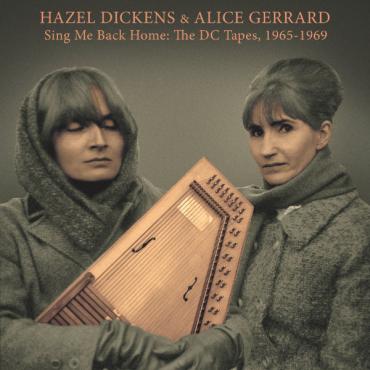Found Recordings Add Personal Touches to Trailblazing Duo’s Legacy

Any time we have new music from Hazel Dickens and Alice Gerrard is a cause for celebration. The highly influential musical duo met up at a late-night folk music gathering in the Baltimore and DC areas. In an oft-told story, Alice Gerrard’s husband, Jeremy Foster, told her “there’s this little girl with a great big voice that you’ve got to hear,” referring to Dickens. The two soon started playing together, exploring the old-time Appalachian music native to Dickens’ West Virginia, as well as the country, bluegrass, and folk songs of The Carter Family, Bill Monroe, and The Louvin Brothers. The women would gather in Gerrard’s kitchen and they’d share songs, working out new arrangements and recording them on reel-to-reel tape. The newly unearthed recordings on Sing Me Back Home: The DC Tapes, 1965-1969 capture the rawness of these gatherings, including many of the sounds around them as they record: children’s chatter and doors opening and closing, as well as the comments the two musicians make between songs. This album features the duo’s singular, arresting arrangements of songs by The Everly Brothers, Merle Haggard, Ralph Stanley, and others.
The collection opens with a stirring, robust version of “Bye Bye Love,” a scampering take on the familiar song, driven by Gerrard’s autoharp and Dickens’ tenor vocal. The duo deliver a fast-paced take on the traditional gospel song “This Little Light of Mine,” featuring a rousing call and response between Dickens and Gerrard on the chorus. The duo walks down Richard “Rabbit” Brown’s “James Alley Blues,” changing the lyrics to reflect a woman’s perspective. Dickens and Gerrard capture the immediacy of emotion in A.P. Carter’s “Little Darling Pal of Mine,” and in their version you can hear very clearly the phrasing and musical structure that Woody Guthrie picked up from this song as the basis for his own “This Land is Your Land.” The duo delivers a moving take on Jim and Jesse McReynolds’ “I’ll Wash the Love from My Heart,” and their version of Jimmie Rodgers’ “No Hard Times” delivers a spare, raw, country blues. Gerrard’s propulsive guitar drives Ralph Hemrick’s “Why Not Confess” as the women’s voices weave over and around the chords. One of the highlights of the album is Gerrard and Dickens’ version of Merle Haggard’s “Sing Me Back Home.” Gerrard’s autoharp leads off the song and its spareness creates the loneliness that floats through the lyrics and the music of the song; toward the end of the song, the women interrupt it to chat quickly about the music. Dickens’ tenor harmony on the tune creates a haunting, ethereal space that mimics the feelings of the prisoner walking down the hall to his death.
Hazel Dickens and Alice Gerrard are American treasures, and the music on Sing Me Back Home: The DC Tapes, 1965-1969 gives us a chance to hear their raw emotional power, their genius for finding their way into and around a song and making it their own, and their restless musical inventiveness.


